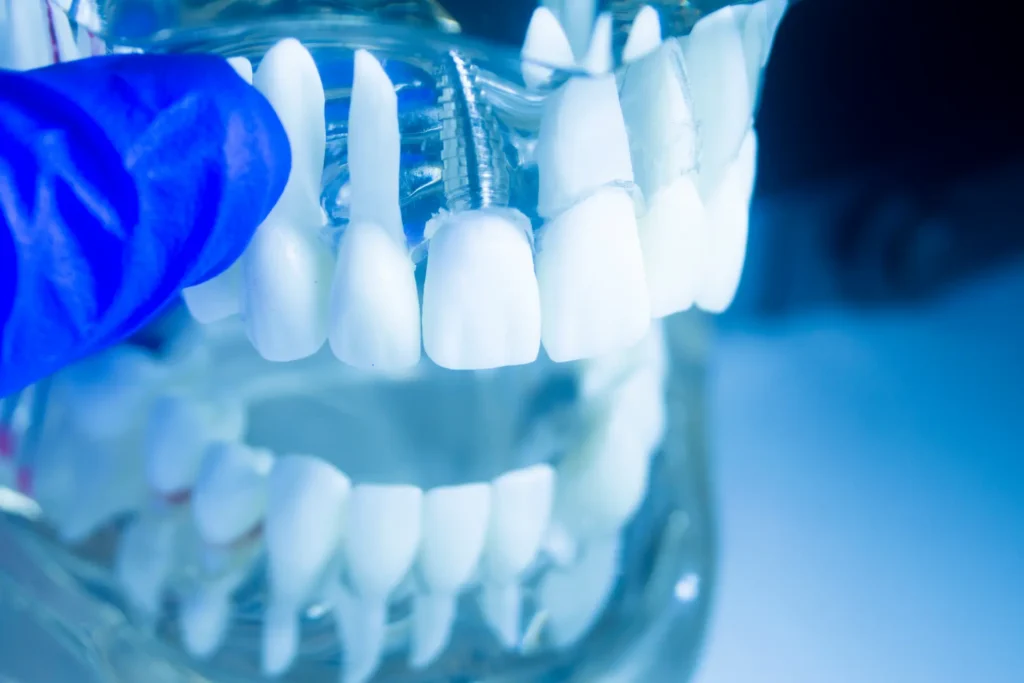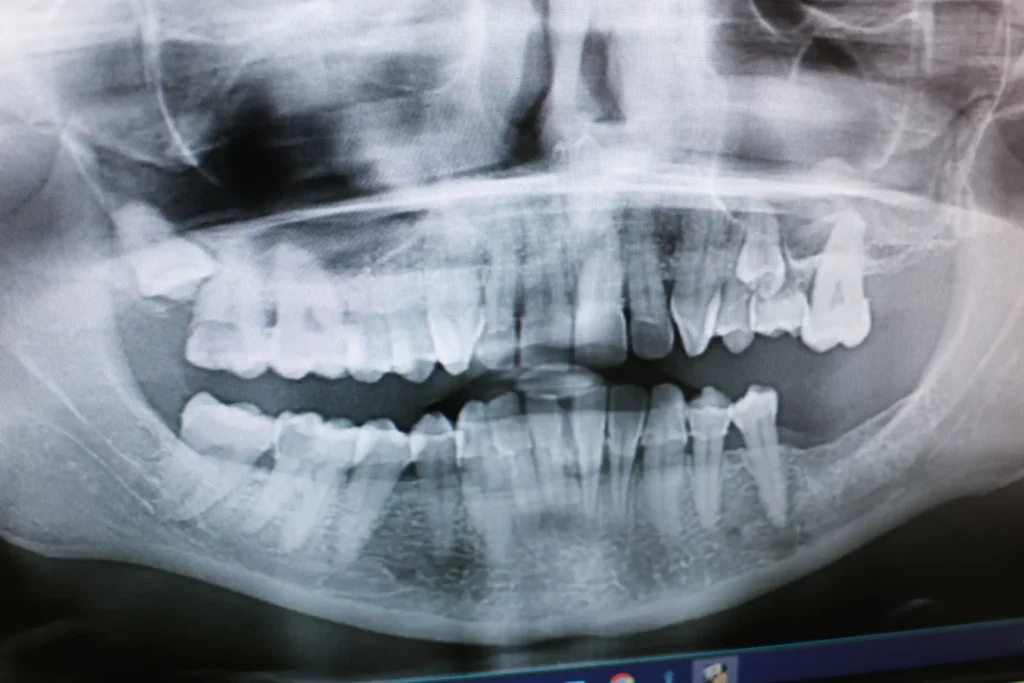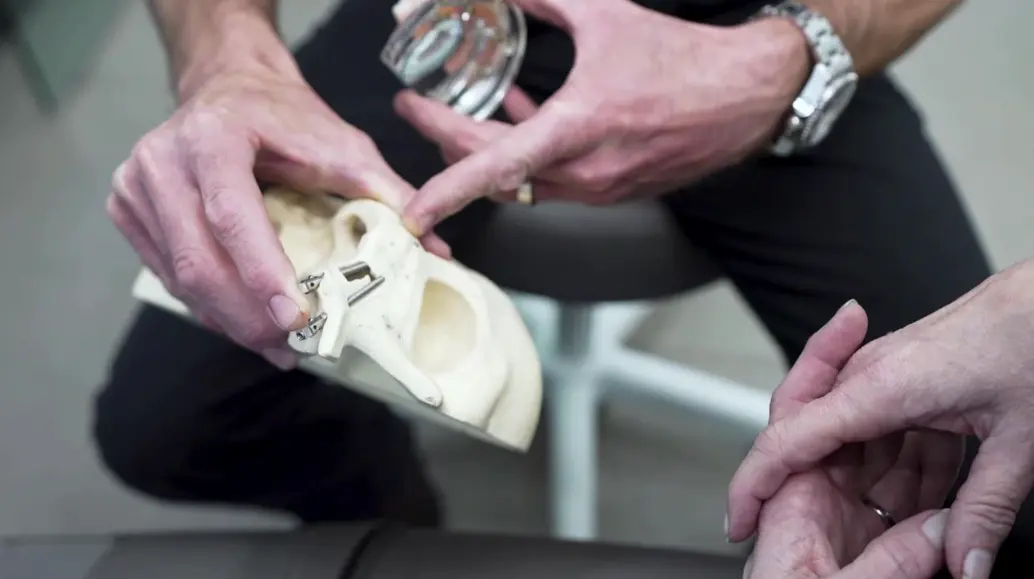Losing a tooth due to an accident or illness can have significant short-term and long-term consequences. Beyond the immediate discomfort and changes in chewing patterns, it can lead to complications such as bone loss, speech difficulties, and a variety of other issues, underscoring the importance of addressing the situation promptly and comprehensively.
Opting for a dental implant to replace the lost tooth can greatly enhance your overall health and quality of life. Let’s explore what dental implants are, their benefits and disadvantages, and their eligibility for patients.
What are Dental Implants?
Dental implants are a modern solution for replacing missing teeth. Unlike dentures or bridges, dental implants are rooted in the jawbone, acting as the foundation for artificial teeth. They are designed to blend seamlessly with your natural teeth, improving not just the look of your smile but also your oral health and overall well-being.
An implant is a small, sturdy post made of titanium or ceramic that is placed into the jawbone where the tooth was lost. This post serves as the tooth’s new root, providing a stable base for attaching a crown, the visible part of the implant that looks just like the real tooth.
Over time, the jawbone heals around the implant, securing it in place and preventing the bone loss that often follows tooth loss.
What are the benefits of getting dental implants?
Getting dental implants offers a wide range of benefits that go beyond just improving your smile. As you can imagine, these benefits positively impact your appearance, speech, self-confidence, and overall health.
Here’s how dental implants can make a difference:
- Dental implants improve appearance and confidence.
- Dental implants allow you to speak without worrying about your teeth slipping, ensuring clearer and more natural speech.
- They offer comfort and stability that feels like your natural teeth.
- With dental implants, you can chew your favorite foods without pain or discomfort.
- They are durable and can last many years, often for a lifetime, with proper care.
- They help protect oral health by preventing bone loss and maintaining the jawbone’s strength and shape.
And if those benefits aren’t enough, did you know that NuSet’s oral specialists offer various types of dental implants so you can find the perfect fit for your needs?
What are the Different Types of Dental Implants?
Two main types of dental implants are widely used: endosteal implants and subperiosteal implants. Each type serves different needs and situations, depending on a patient’s jawbone health and preferences.
Endosteal Implants
These are the most common types of dental implants. Endosteal implants are directly inserted into the jawbone. Your oral surgeon will then attach a post to the implant before adding your final restoration.
Your final restoration is then attached to the post individually or grouped on a bridge or denture. These implants are suited for patients with a healthy and adequate jawbone to support the implant.
Subperiosteal Implants
These implants are a suitable option for patients who do not have a healthy jawbone and do not want to undergo a bone augmentation procedure to rebuild it. Instead of being fixed into the jawbone, subperiosteal implants consist of a frame that is placed under the gum but above the jawbone. Posts are attached to the frame, and as the gums heal, the frame becomes fixed to the jawbone. Your final restoration, your new teeth, are then mounted to the posts protruding from the gums.
Choosing the right type of dental implant depends on various factors, including the health and density of your jawbone, overall health, and specific needs and preferences. But don’t worry—NuSet’s oral surgeon and patient consult will help you understand the best option for your situation and ensure you receive the most suitable type of implant for your oral health. All you need to do is schedule your first consultation.

Dental Implant Advantages vs Disadvantages
Dental implants offer several advantages, making them a popular choice for replacing missing teeth. However, like any medical procedure, they also come with some potential disadvantages.
Advantages of Dental Implants
- Improved stability and comfort.
- Dental implants help preserve surrounding teeth.
- Implants stimulate the jawbone, preventing the bone loss that typically occurs with tooth loss.
- With easier access between teeth, dental implants improve oral hygiene.
- Dental implants are durable and can last a lifetime with proper care.
Disadvantages of Dental Implants
- The initial cost of dental implants can be higher than other tooth replacement options. However, you can take advantage of NuSet’s affordable payment plan options.
- As with any surgery, there is a risk of complications, such as infection, nerve damage, or implant failure.
Despite the disadvantages, dental implants have benefits that far outweigh the potential drawbacks. Discussing them with your dentist will help you understand whether they are the right option for you, considering your specific needs and circumstances.
Dental Implant Success Rate
Dental implants boast a high success rate, which is one reason they are a preferred method for replacing missing teeth. Studies and clinical evidence consistently show success rates above 97%, making them a reliable and effective solution for most patients.
Several factors influence the success of dental implants, including the patient’s oral hygiene practices and overall health. Good oral hygiene, such as regular brushing, flossing, and routine dental check-ups, is crucial for maintaining the health of the implant and surrounding tissues. Additionally, avoiding smoking and managing chronic conditions like diabetes can significantly contribute to the long-term success of dental implants.
Proper planning and execution by a qualified dental professional also play vital roles in the procedure’s success. This includes a thorough evaluation of the patient’s dental and medical history, precise placement of the implant, following post-op instructions, and careful monitoring during the healing process.
While dental implants are highly successful, patients need to understand that, like natural teeth, implants require ongoing care and attention to ensure their longevity.
When Should You Get a Dental Implant?
Deciding the right time to get a dental implant is crucial for the success of the procedure and your overall oral health. Generally, dental implants are recommended in the following scenarios:
- After tooth loss due to decay or disease.
- Following an injury due to an accident that has led to tooth loss.
- Age-related tooth loss.
It’s important to act promptly when considering dental implants. Waiting too long after tooth loss can lead to bone loss in the jaw, making the implant process more complex.
Early consultation with a dental professional can help determine the best timing for your implant, potentially avoiding the need for additional procedures like bone grafting.
Dental Implant Procedure
The dental implant procedure is a multi-step process designed to replace missing teeth with artificial ones that look, feel, and function like natural teeth. Here’s a step-by-step breakdown of what to expect:
Initial Consultation
The first step is a thorough examination by your dentist, including X-rays or 3D images, to assess the health of your jawbone and determine the best implant strategy.

Treatment Planning
We will create a personalized treatment plan based on the initial assessment.
Implant Placement
The dental implant, a small titanium post, is placed into the jawbone where the missing tooth was. This procedure is typically done under local anesthesia to minimize discomfort. In some cases, patients can receive immediate dental implants, also known as “teeth in a day,” where temporary teeth are placed on the same day as the implant surgery.
Healing and Bone Integration
After the implant is placed, a healing period follows, during which the implant fuses with the jawbone in a process called osseointegration. This can take several months, but it’s crucial for providing a strong foundation for your new tooth.
Abutment Placement
Once osseointegration is complete, a second consultation might be needed to place the abutment, which will hold the final restoration. After the gum tissue heals around the abutment, molds of your teeth are taken to create your new teeth that look and feel natural.
New Tooth Attachment
The final step involves attaching the final restoration to the abutment. The crown is customized to match your natural teeth, ensuring a seamless fit and appearance. For those who received immediate implants, the permanent crown replaces the temporary one after osseointegration is complete.
Follow-Up Visits
After the crown is placed, you may have follow-up visits to check the implant, abutment, and crown, ensuring everything functions as it should.
Your comfort and care are top priorities throughout the dental implant process. At NuSet, we use our expertise to ensure the procedure is as smooth and pain-free as possible. With proper care, the results can last a lifetime.
Tooth Implant Recovery Phase
After getting a dental implant, the recovery period is an essential phase that ensures the success of the procedure. Here’s what you can expect during the recovery process:
Immediate Aftercare
It’s normal to experience some swelling, bruising, minor bleeding, and discomfort right after the surgery. We will provide specific instructions on how to manage these symptoms, which may include taking prescribed pain relievers, applying ice packs to reduce swelling, and eating soft foods.
Healing Time
The initial healing phase, where the implant begins to integrate with the jawbone, typically lasts a few weeks to a few months. During this time, it’s important to avoid putting pressure on the implant area and follow a soft diet to aid healing.
Oral Hygiene
Maintaining good oral hygiene is crucial for the healing process. You should gently clean the implant site as instructed and avoid vigorously brushing or flossing around the surgical area until it fully recovers.
Follow-Up Visits
You will have follow-up visits with your dentist to monitor the implant’s integration into the jawbone and the healing of your gums. These appointments are essential for ensuring the implant is healing correctly and to address any concerns you may have.
Recovery from dental implant surgery varies from person to person, depending on individual health, the complexity of the procedure, and how well post-operative care instructions are followed.
Why Dental Implants are the Choice for a Better Smile
Dental implants stand out as a superior solution for replacing missing teeth, offering a combination of durability, functionality, and aesthetic appeal unmatched by other options. They provide a stable foundation for artificial teeth, allowing for improved appearance, speech, comfort, and the confidence to eat a wide variety of foods without hesitation.
If you’re considering dental implants as a solution for missing teeth, contact us to start your journey to a beautiful and complete smile. Our team of experts is dedicated to providing you with the highest standard of care and ensuring that your dental implant journey is as smooth and successful as possible.
Don’t let missing teeth hold you back any longer. Contact us today to learn how dental implants can transform your smile and life.
Frequently Asked Questions
How Many Years Does a Tooth Implant Last?
Dental implants are designed to be a long-lasting solution for missing teeth, and with proper care and maintenance, they can last a lifetime. Longevity depends largely on the patient’s oral hygiene practices and lifestyle habits. Regular brushing, flossing, routine dental check-ups, and cleanings are vital to prevent infections and ensure the implant and surrounding gums remain healthy.
What is the Best Age for Dental Implants?
Dental implants are suitable for adults of all ages, from young adults to seniors. The key consideration is not age but rather the health of the jawbone and the individual’s general health. Adequate bone density is required to support the implant, and good oral hygiene practices are necessary to maintain it. Additional procedures like bone grafting may be considered when bone density is insufficient.
What Disqualifies You from Dental Implants?
While many people are good candidates for dental implants, certain conditions can complicate or disqualify an individual from receiving them. Uncontrolled diabetes, heavy smoking, and significant bone loss are among the top factors that can negatively impact the healing process and the integration of the implant with the jawbone. It’s essential to disclose your full medical history to your dentist, who can assess your situation and recommend the best course of action.
Where to Get Dental Implants Near Me?
Finding a skilled and reputable dental implant provider is crucial for a successful implant procedure. NuSet Dental Implant and Oral Surgery is available in seven locations across the USA. You can find the nearest dental implant clinic here.





